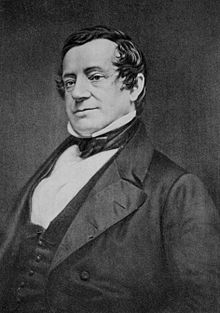Washington Irving
| Washington Irving | |
|---|---|

|
|
| Born |
April 3, 1783 New York City, New York |
| Died | November 28, 1859 (aged 76) Sunnyside, Tarrytown, New York |
| Occupation | Short story writer, essayist, biographer, magazine editor, diplomat |
| Literary movement | Romanticism |
|
|
|
| Signature | |
Washington Irving (April 3, 1783 – November 28, 1859) was an American short story writer, essayist, biographer, historian, and diplomat of the early 19th century. He is best known for his short stories "Rip Van Winkle" (1819) and "The Legend of Sleepy Hollow" (1820), both of which appear in his book The Sketch Book of Geoffrey Crayon, Gent. His historical works include biographies of George Washington, Oliver Goldsmith, and Muhammad, and several histories of 15th-century Spain dealing with subjects such as Christopher Columbus, the Moors and the Alhambra. Irving served as the U.S. ambassador to Spain from 1842 to 1846.
He made his literary debut in 1802 with a series of observational letters to the Morning Chronicle, written under the pseudonym Jonathan Oldstyle. After moving to England for the family business in 1815, he achieved international fame with the publication of The Sketch Book of Geoffrey Crayon, Gent. in 1819–20. He continued to publish regularly—and almost always successfully—throughout his life, and just eight months before his death (at age 76, in Tarrytown, New York), completed a five-volume biography of George Washington.
Irving, along with James Fenimore Cooper, was among the first American writers to earn acclaim in Europe, and Irving encouraged American authors such as Nathaniel Hawthorne, Herman Melville, Henry Wadsworth Longfellow, and Edgar Allan Poe. Irving was also admired by some European writers, including Walter Scott, Lord Byron, Thomas Campbell, Francis Jeffrey, and Charles Dickens. As America's first genuine internationally best-selling author, Irving advocated for writing as a legitimate profession and argued for stronger laws to protect American writers from copyright infringement.
...
Wikipedia
